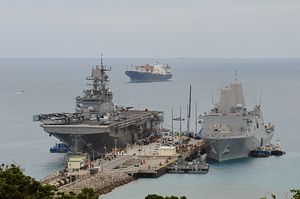On Monday, the U.S. Navy in Japan ordered all sailors to remain on their bases, and imposed a ban on alcohol consumption on- and off-base. This applies not only to sailors based in Japan, but also those transiting through the island country. Though the Navy does not have the authority to impose this order on civilian contractors or family members, they are asking for a voluntary observation of this restriction.
This restraining order and alcohol ban – the most restrictive order in several years on the 18,600 sailors in Japan – comes after Petty Officer Second Class Aimee Meija, assigned to Kadena Air Base in Okinawa, was arrested on suspicion of drunk driving when she was driving on the wrong side of the road. In the resulting accident, she hit two cars and injured two people. A breathalyzer test found she had a blood-alcohol level of 0.18, six times the legal limit in Japan – eight days into a 30-day, off-base drinking ban that had been imposed in Okinawa.
The drunk driving incident is “especially hurtful and regrettable because it occurred during the period of unity and mourning,” according to Cmdr. Ronald Flanders, U.S. Naval Forces Japan spokesperson. The U.S. military had declared a period of unity and mourning following the discovery of the body of Rina Shimabukuro, a local 20-year-old Japanese woman, on May 19. A Kadena-based American contractor, Kenneth Franklin Gadson (who goes by Shinzato), was arrested in the case.
In a separate incident earlier in March, also stoking anti-base sentiment, a U.S. sailor raped a Japanese tourist.
Flanders stated: “We have recognized a problem, we’re owning it, and we’re doing everything we can to ensure that every one of our sailors understands how important our behavior is to the alliance and to our relationship to the people of Japan.”
In Washington, Pentagon Spokesperson Peter Cook likewise affirmed the measure was taken “to send a message to forces in Okinawa – and send the most appropriate message not only to those forces, but also to the Japanese people, and the Japanese government – about the seriousness with which we take this.”
The liberty restriction applies to all those who do not have in-town accommodations. Those with in-town accommodations will have their freedom of movement restricted to the basic necessities – such as travel to work, schools, gas stations, grocery stores, and gyms. This will remain in place until all personnel receive new, face-to-face training.
Sailors already receive an orientation briefing on proper conduct when they arrive, but the additional training is expected to also frankly discuss how the conduct of individuals over the past several months has strained U.S.-Japan relations and affected U.S. security plans in the region. (According to recent reporting by The Japan Times, the existing training documents are not without faults either.)
There is no timeline for the lifting of the alcohol ban. It will not be lifted until the commander of the 7th Fleet and the commander of the Naval Forces Japan are confident that “all personnel have fully embraced their responsibilities of being a U.S. ambassador at all times.”
Rear Admiral Matthew Carter, commander of U.S. Naval Forces Japan, admonished, “For decades we have enjoyed a strong relationship with the people of Japan. It is imperative that each sailor understand how our actions affect that relationship and the U.S.-Japan alliance as a whole.”
Though the U.S.-Japan alliance is a cornerstone of peace and prosperity in the Asia-Pacific region, the strength of that alliance has been tested by these recent incidents. Yes, the U.S. bases can – and will likely – remain on Okinawa regardless of what the local residents want, but it is always better, especially for a state such as the United States which professes to adhere to the democratic way, to have local acquiescence.
Stars and Stripes reported that “[m]ilitary officials said privately Monday that misconduct is taking up considerable time among senior leaders, stealing focus from the region’s myriad security challenges.”
It also stole the spotlight at the U.S.-Japan bilateral summit held the day before the G7 Summit in Ise-Shima. At the press conference following the summit, Prime Minister Shinzo Abe’s remarks were dominated by expressing “profound resentment” against the “self-centered and despicable crime” committed by Shinzato against Shimabukuro.
Earlier on the same day the ban went into effect, Okinawa Governor Takeshi Onaga’s supporters won a majority in the prefectural assembly. Onaga is a former Liberal Democratic Party member, but now runs and governs on a platform opposed to the central government and the ruling party. He represents Okinawans’ desire to see the U.S. military presence decreased on Okinawa.
Picking up three seats, the pro-Onaga faction can now claim 27 seats in the 48-member assembly. This – on the coattails of such tragic incidents – is likely to make Onaga more confrontational against the central and U.S. government regarding the Futenma relocation.
In response, both Japan and the United States rushed to reaffirm their commitment to the relocation. Japanese Chief Cabinet Secretary Yoshihide Suga said, “There is no change in the stance that the relocation to Henoko is the only way to solve [the base issue].” Across the Pacific Ocean, State Department Press Office Director Elizabeth Trudeau reiterated, “Our position on the relocation of Futenma has not changed. We continue to work with the Government of Japan to move ahead on that.”
A mass, Okinawa-wide, anti-relocation rally is scheduled for June 19. The organizers are hoping to mobilize on the scale of the protests that followed the 1995 rape of an Okinawa girl – or around 85,000 people. It will likely be the biggest protest since the September 2012 protests against the Osprey deployment.
It is timed to precede Okinawa Memorial Day, a day to mourn the victims of the U..S invasion, celebrated annually on June 23.
































